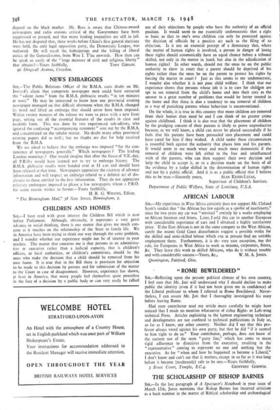CHILDREN AND HOMES
SIR,—I have read with great interest the Children Bill which is now before Parliament. Although, obviously, it represents a very great advance in social thinking, there is one matter that gives me much con- cern as it touches on the relationship of the State to family life. We in America have been trying to think our way through the same problem, and I wonder whether our experience might not be of interest to your readers. The matter that concerns me is that persons in an administra- tive or executive rather than a judicial capacity, that is children's officers, or local authorities, or children's committees, should be the ones who make the decision that a child should be removed from his own home. It is true that in the Bill there is provision for objection to be made to this decision by parents and for submission of the matter to the Court in case of disagreement. However, experience has shown, at least in America, that many people feel themselves quite powerless in the face of a decision by a public body or can very easily be talked out of their objections by people who have the authority of an official position. It would seem to me essentially undemocratic that a right as basic as that to one's own children can only be protected against the decision of officials by a positive act such as the filing of an objection. Is it not an essential precept of a democracy that, where the matter of human rights is involved, a person in danger of losing these rights should automatically have an equal chance before a tribunal skilled, not only in the matter in hand, but also in the adjudication of human rights? In other words, should not the onus be on the public authority to show in court that a parent should be deprived of his rights rather than the onus be on the parent to protect his rights by forcing the matter to court ? Just as this seems to me undemocratic, I wonder also whether it is not poor child welfare. I think that our experience shows that persons whose job it is to care for children are apt to see removal from the child's home and into their care as the answer to a great number of problems that would be better treated in the home and that there is also a tendency to use removal of children as a way of punishing parents whose behaviour is unconventional.
On the whole, it is true in this country that more children are removed from their homes than need be and I can think of no greater crime against childhood. I think it is also true that the placement of children by the grudging consent of their parents is likely to prove unproductive because, as we well know, a child can never be placed successfully if fie feels that his parents have been persuaded into placement and could have cared for him if they wished. A child under these circumstances is resentful both against the authority that places him and his parents. It would seem to me much wiser and much more democratic if the removal of children were left either to the free and uninfluenced wish of the parents, who, can then support their own decision and help the child to accept it, or to a decision made on the basis of all the evidence by a judge skilled in the determination of human rights and not by a public official. And it is as a public official that I believe this to be true.—Sincerely yours, ALAN KEITH-LUCAS,
Supervisor of Children's Services.
Department of Public-Welfare, State of Louisiana, U.S.A.






























 Previous page
Previous page